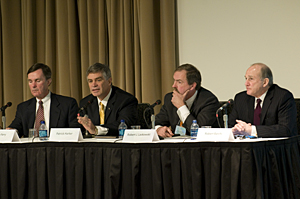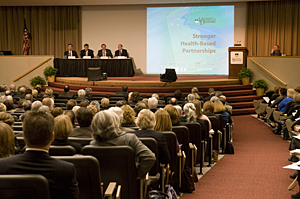
5:10 p.m., March 24, 2009----A new coalition of leading education, healthcare and medical research institutions, the Delaware Health Sciences Alliance, was announced during the “Stronger Health-Based Partnership” conference held Tuesday, March 24, in Clayton Hall at the University of Delaware.
Joining UD President Patrick Harker in announcing the creation of the alliance were presidents of the partner institutions Robert Laskowski of Christiana Care Health System, Tom Ferry of Nemours and Robert L. Barchi of Thomas Jefferson University.
Combining the priorities and assets of the member institutions, the Delaware Health Sciences Alliance will provide leadership in the improvement of health and health services to all Delawareans. The alliance also will provide a key element to the First State's economic future through the nurturing of research and the development of advanced technology.
Harker said the alliance will further the University's goals of becoming a premier research and graduate institution and achieving excellence in professional education as outlined in the strategic plan, the Path to ProminenceTM.
“This alliance, critical on its own merits, is also a critical vehicle for advancing UD's strategic priorities and fulfilling the mission to which we obligated ourselves one year ago,” Harker said. “Neither goal will be advanced without close and dynamic partnership with the researchers and clinicians who deal in pressing healthcare challenges daily.”
Harker noted that the four alliance partners have a long, shared history of collaborating with one another. For example, the Partnership in Health Education, announced last fall, formalized the collaboration between UD and Thomas Jefferson University, enabling articulated degree pathways and joint research and grant proposals.
“Before the partnership, we hadn't really pursued collaboration with a defined framework,” Harker said. “That partnership and this alliance give us that framework.”
Harker said the alliance also represents a way to articulate common priorities, including:
* World-class healthcare education;
* Interdisciplinary “bench-to-bedside” research;
* Better healthcare quality and delivery; and
* Combining expertise and resources to meet those priorities.
A key component of healthcare education represented by the alliance will be the development of a Campus for Healthcare Education in Delaware. The campus will include classrooms, study halls, and a new residential facility for up to 150 medical, pharmacy, nursing, occupational and physical therapy students.
Ferry, senior vice president of hospital operations for Nemours and chief executive officer of the A.I. duPont Hospital for Children, said that in Delaware, collaboration is a model for success and the alliance would enhance the development of health sciences in the state.
“The primary goals of the alliance include improving the health of the people of Delaware, while at the same time improving the economic development of the state,” Ferry said. “One of the first things that took place in discussions about the alliance was to inventory all of the existing relationships of the alliance members. The result was a list over 40 pages long of formal and informal relationships in patient care, education and research.”
While the relationships have been successful, Ferry said they have largely been one-on-one affairs and for limited and specific purposes.
“The Delaware Health Sciences Alliance will build on the history of these one-on-one relationships and seek to take it to the next level with the power of all four institutions,” Ferry said. “Instead of seeking individual research grants, the alliance will be responsive to the desire of the National Institutes of Health (NIH) to form collaborative applications.”
Besides securing federal grant money, Ferry said the new alliance also will help in bridging the gap in healthcare providers in the state. This effort should increase the supply of healthcare providers throughout the state, especially in underserved areas. “New clinical programs will ensure that care is available in areas such a cardiovascular disease, women's and children's health, cancer care and neuroscience,” he said.
Ferry also noted that future membership of the alliance would not be limited to the founding member institutions.
“The intent is for the collaboration to extend beyond the members and to include other hospitals and other educational institutions in the state, as well as other community-based organizations,” Ferry said. “We all look forward to working together in the future.”
The Delaware Health Sciences Alliance is also committed to growing the biosciences industry in the state through close working relationships with the business community, resulting in hundreds of professional and support jobs for the state of Delaware.
Barchi described the Delaware Health Sciences Alliance as not just an evolutionary but also a revolutionary step forward in the way Delaware approaches its healthcare issues and its healthcare opportunities.
Healthcare and the business of healthcare represent both an enormous opportunity and an enormous risk for the country, Barchi said.
“If you look at healthcare and biomedical technology and the areas that surround it, they are one of the fastest growing and most robust parts of our economy. There are huge opportunities for growth and for focus in this state,” Barchi said. “At the same time, healthcare represents one of the greatest risks that we have to the financial stability of this country. If we don't solve the economics of healthcare in the next few years, no matter what happens to the banking industry, we are going to be in very, very deep trouble.”
Barchi said that despite the fact that the United States spends about $7,000 per person annually for healthcare, the nation ranks poorly in key areas.
“Changing that is going to require a new paradigm in how healthcare is delivered, and how it's financed and how it's insured,” Barchi said. “It will certainly require additional trained healthcare personnel, trained and functioning as teams of healthcare delivery individuals and not as individual practitioners.”
Delaware has unique problems, Barchi said, because it has one of the fastest growing populations over 65 in the United States, as well as having a very large rural population, an area that is traditionally underserved by healthcare professions.
“It's not enough to bring Delawareans to Jefferson to train. Statistics say that about 50 percent of students who graduate from medical school do their residency at that location and will stay there to grow their families,” Barchi said. “We want to educate Delawareans to take our medical students and move them to back to the state so they can experience the richness of the state, experience the richness of the other medical entities down here, get hooked, do their residencies and stay here.”
Laskowski said that Delaware is unique in that it can provide opportunities for collaboration and accomplishment and that healthcare is not something that can be accomplished alone.
“This is particularly true in healthcare delivery, in health sciences research and in health sciences education,” Laskowski said. “That is the reason I'm so enthusiastic about the alliance. It is a way to get things done effectively and efficiently.”
The collaboration represented by the alliance draws on the strengths of UD as a research university; Thomas Jefferson University, one of the world's preeminent health sciences universities; Nemours, one of the country's largest, if not the largest organization focused on the health of children; and Christiana Care, the largest private employer in Delaware, Laskowski said.
“All of us working together in various bilateral and multilateral ways, we will be an economic engine for development and a major contributor to the improved health of the larger community,” Laskowski said. “We are very proud to be part of such a historic undertaking.”
Other alliance initiatives already under way include:
* Delaware Valley Institute for Clinical and Translational Science (DVICTS), which seeks to acquire new grants that could collectively fund greater research discoveries and ensure rapid movement of discoveries from the lab to clinical settings to the patient - from “bench to bedside”;
* Delaware Center for Cancer Biology, which will build upon unique research capabilities of the Kimmel Cancer Center at Jefferson, the Helen F. Graham Cancer Center at Christiana Care, the Nemours Center for Childhood Cancer Research and the Center for
Translational Cancer Research, along with researchers at UD, Christiana Care, Nemours and the Delaware Biotechnology Institute; and
* Delaware Rehabilitation Institute, which will leverage partner strengths to become the premier research, training and practice center in the nation in the area of physical rehabilitation.
Major centers are being considered in the areas of cardiovascular disease, women's and children's health, neuroscience and health policy.
Article by Jerry Rhodes
Photos by Kathy Atkinson and Evan Krape



